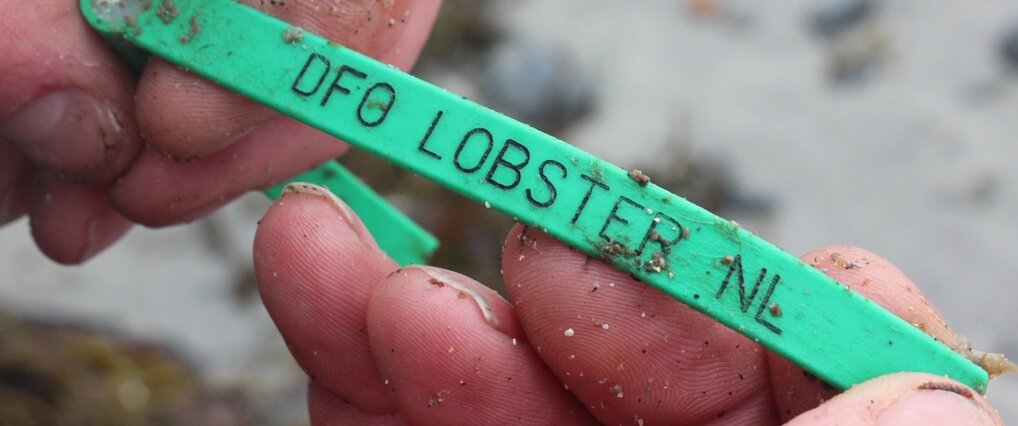On May 20 2016 Fisheries and Oceans Canada (DFO) announced its intention to implement a licensing and tagging system for the Newfoundland and Labrador Recreational Groundfish fishery beginning in the 2017 season. Under this new system fishermen and women will be required to attach plastic tags to their fish in an attempt to monitor the harvest. Since carcasses are generally returned to the water after filleting, this practice will open up an entirely new pathway for the introduction of plastics into our marine environment and into our food webs. Once introduced, plastics can be quickly dispersed; Newfoundland and Labrador lobster tags dating back as far as 1988 have been found as far away as the shores of Scotland and England (Hill, 2015), so a mistake now can have effects for generations. These particles are available to be ingested by marine species, introducing their potentially harmful effects into the human food web. Scientists have found that toxic chemicals such as pesticides, methyl mercury, benzene, and other pollutants, adhere to plastics and accumulate in an animals’ tissues when those plastics are ingested (Mato et al., 2001; Rochman et al., 2013; Teuten et al., 2009). Last summer, the Civic Laboratory for Environmental Action Research at MUN conducted a study on the plastic ingestion rate in cod caught on the island and found one of the lowest rates in the world – just 2.4% (Liboiron et al., 2016)- let’s keep it that way! We ask that if this tagging system is really necessary, one possibility is that DFO use metal tags similar to the ones they use in their own research rather than plastic, a known marine pollutant. The public consultation process on the new licensing and tagging system is currently underway. Comments and feedback can be submitted via email to from now until November 30 2016. Signing the petition below automatically sends a letter to this address. Please enter your information in the fields below to send your letter. Click on “Read the Petition” if you would like to edit the letter before you send it. Further information and a schedule of public consultation meetings can be found on the DFO website at http://www.inter.dfo-mpo.gc.ca/NL/CC/Recreational-Groundfish-Consultations-2016 This letter has been drafted by scientists at the Civic Laboratory for Environmental Action Research (CLEAR), a marine science laboratory at Memorial University of Newfoundland that has been conducting studies of plastic pollution in Newfoundland fish. Your letter Dear DFO, I am writing in response to DFO’s intention to implement a licensing and tagging system for the Newfoundland and Labrador Recreational Groundfish fishery beginning in the 2017 season. I am deeply concerned about the plastic pollution this tagging regime will introduce to our waters and food web. Since carcasses are generally returned to the water after filleting, this practice will open up an entirely new pathway for the introduction of plastics into our marine environment and into our food webs. Once introduced, plastics can be quickly dispersed; Newfoundland and Labrador lobster tags dating back as far as 1988 have been found as far away as the shores of Scotland and England (World Animal Protection, 2015), so a mistake now can have effects for generations. These particles are available to be ingested by marine species, introducing their potentially harmful effects into the human food web. Scientists have found that toxic chemicals such as pesticides, methyl mercury, benzene, and other pollutants, adhere to plastics and accumulate in an animals’ tissues when those plastics are ingested (Mato et al., 2001; Rochman et al., 2013; Teuten et al., 2009). Last summer, the Civic Laboratory for Environmental Action Research at MUN conducted a study on the plastic ingestion rate in cod caught on the island and found one of the lowest rates in the world – just 2.4% (Liboiron et al., 2016 )- let’s keep it that way! We ask that if this tagging system is really necessary, one possibility is that DFO use metal tags similar to the ones they use in their own research rather than plastic, a known marine pollutant. Sincerely, [Your name] cc Hon. Dominic LeBlanc, Minister of Fisheries and Oceans Hon. Catherine McKenna, Minister of Environment and Climate Change Hon. Edward Fast, Conservative Critic of Environment and Climate Change Hon. Nathan Cullen, NDP Critic of Environment and Climate Change References Hill, T. (2015, June 20). Abandoned fishing gear makes 3,000-mile journey to litter Scotland’s beaches. Retrieved from http://www.takepart.com/article/2015/06/20/maine-lobster-traps-show-scotland Liboiron, M., Liboiron, F., Wells, E., Richárd, N., Zahara, A., Mather, C., Bradshaw, H., Murichi, J. (2016). Low plastic ingestion rate in Atlantic cod (Gadus morhua) from Newfoundland destined for human consumption collected through citizen science methods. Marine Pollution Bulletin, MPB-08118, http://dx.doi.org/10.1016/j.marpolbul.2016.10.043 Rochman, C.M., Hoh, E., Kurobe, T., Teh, S.J. (2013). Ingested plastic transfers hazardous chemicals to fish and induces hepatic stress. Scientific Reports, 3:3263. http://dx.doi.org/10. 1038/srep03263. Teuten, E. L., Saquing, J. M., Knappe, D. R. U., Barlaz, M. A., Jonsson, S., Björn, A., Rowland, S. J., Thompson, R. C., Galloway, T. S., Yamashita, R., Ochi, D., Watanuki. Y., Moore, C., Viet, P. H., Tana., T. S., Prudente, M., Boonyatumanond, R., Zakaria, M. P., Akkhavong, K., Ogata, Y., Hirai, H., Iwasa, S., Mizukawa, K., Hagino, Y., Imamura, A., Sahu, M., & Takada, H. (2009). Transport and release of chemicals from plastics to the environment and to wildlife. Philisophical Transactions of the Royal Society B, 364(1526), 2027-2045. doi:10.1098/rstb.2008.0284
Endocrine Disruptors
What is the Canadian government doing to monitor endocrine disrupting chemicals, such as bisphenol A, in our bodies and the wider environment?
Water Quality and the Oil Sands
How are the oil sands affecting the health of our waterways?
Marine Plastics
How are ocean plastics impacting human and marine health?
Department of Fisheries and Oceans Archive
Where’s the data? What happened to the Department of Fisheries and Oceans Archive?
Contaminants in the Far North
How do contaminants in the Far North affect the health of Aboriginal peoples?

